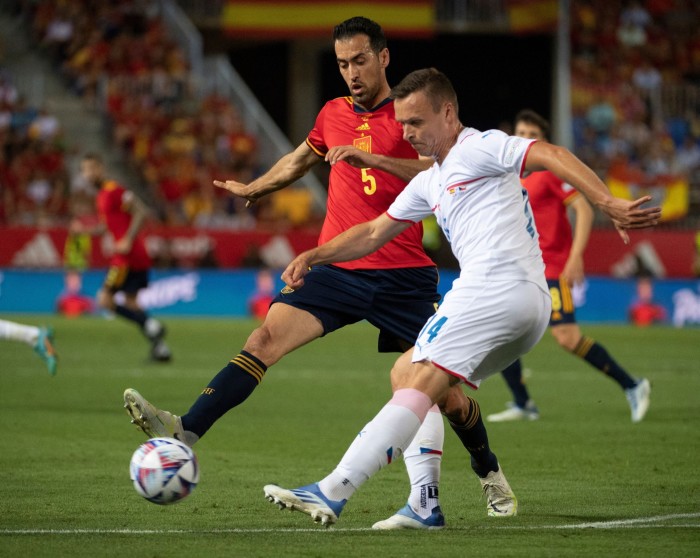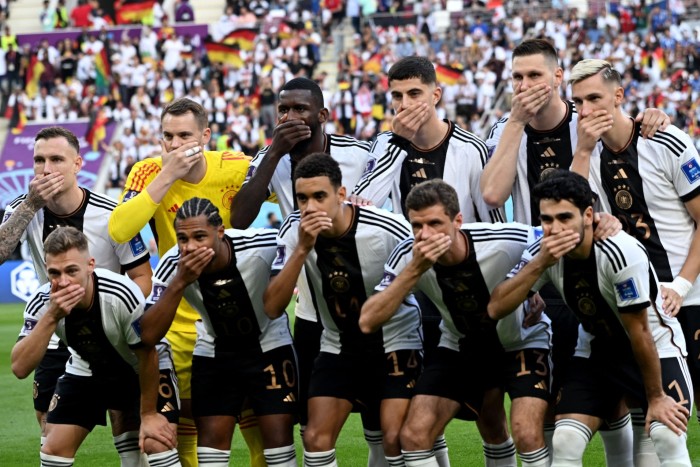If Jakub Jankto had chosen any job other than professional football, he says he would probably have disclosed his homosexuality a decade ago. But the Czech midfielder waited until he was 27 to become the first current international player to come out.
“Football is a little bit homophobic, but I trust that with my example it’s going to get better,” Jankto said. “I know many people who work in factories or banks [and are openly gay] but in football it’s always a tough decision.”
His announcement last month was widely welcomed by leading players such as Neymar and by gay rights groups, but it has also put the spotlight on whether the men’s game is doing enough to support players with different sexual orientations and tackle homophobic attitudes among players and fans.
Fifa shared its support for Jankto on Twitter, but two months earlier the game’s governing body suffered a backlash over the World Cup in Qatar, a repressive Gulf state that bans homosexual acts. A Qatari official referred to homosexuality as “damage of the mind” while Fifa banned an initiative by European teams to promote inclusion with rainbow armbands and fans were barred from showing support for gay rights inside stadiums.
Jankto described his life since coming out as a liberation, and so far unexpectedly free of the insults and abuse he had feared. He said he had received sponsorship offers since his disclosure.
“I can finally play football [feeling] completely free and I don’t have to think about it, not just on the pitch but also off the pitch,” Jankto told the Financial Times at the training ground of his club Sparta Prague. “Maybe I was expecting some bad reaction but 99 per cent was really good.”

Few gay male footballers have revealed their sexuality. Players who made public disclosures, such as German international Thomas Hitzlsperger, often did so after retiring. In 2021 Josh Cavallo became the first openly gay top-flight player at Australia’s Adelaide United. In England, Jake Daniels of second-tier Blackpool came out last year, more than three decades after Justin Fashanu’s disclosure towards the end of his career drew a hostile reaction. Fashanu died by suicide in 1997.
Many female footballers, including leading players such as US star Megan Rapinoe, are openly lesbian. Jankto said Czech goalkeeper Barbora Votiková, who plays for Paris Saint-Germain, was an inspiration. “Maybe the men have more fear,” he said.
Jankto recalled the struggle of striving for success on the pitch while feeling “under pressure” to meet the heterosexual expectations placed on male football stars. “From 15 to 26, I always tried to have relationships with girls but it didn’t go well. Last year I said that this didn’t make sense . . . I didn’t want to hide myself any longer.”

Stefan Lawrence, senior lecturer on sports business management at Leeds Beckett University, said women’s football had a “more open and accepting culture”, partly because it was “predicated upon a challenge to ‘traditional’ gender norms”.
Men’s football historically “performed quite the opposite function, which was to confirm and reinforce traditional gender roles,” Lawrence said, creating a “culture which tacitly promotes compulsory heterosexuality”.
Jankto has represented the Czech Republic 45 times since his 2017 senior international debut. After playing in Italy’s leading division, including nearly 100 appearances for Sampdoria after a €15mn move from Udinese, he joined top-flight Spanish club Getafe, which sent him on loan last year to Sparta, the most successful Czech club.
Among the EU’s former communist states, the Czech Republic is one of the most progressive in attitudes towards LGBT+ rights. In 1962 the-then Czechoslovakia decriminalised homosexuality; it equalised the age of consent to sex at 15 in 1990. Prague legalised same-sex partnerships in 2006.
But more than his country’s liberal reputation, Jankto said that returning to his family environment facilitated his decision to come out: “For sure it’s better for me to say this in the Czech Republic because I’m at home. I probably wouldn’t have said this in Spain.”
Jankto said he disclosed his homosexuality last year to close friends and family, including his partner, Markéta Ottomanská, a model with whom he broke up. They have a three-year old son. He then told his coach and teammates before going public in a video released last month.

In 2021 Jankto helped his national team reach the quarterfinals of the European Championship, but the Czechs did not qualify for the winter World Cup in Qatar.
Jankto said Fifa and other governing bodies “can help more” in tackling prejudices within the game, but felt the problems ran deeper than the racist or homophobic chants directed at players from the stands: “I don’t think it’s a problem of the [fans], it’s a general problem.”
Sparta’s director of communications, Ondřej Kasík, said the club “decided to be somewhere in the middle, not to become activists but at the same time to protect Jakub and explain to people that the club fully stands behind him”.
But for the club’s younger players, Jankto’s decision has reverberated. “It’s brave of him,” said Kai Jupa-Williams, a 15-year-old Canadian who moved to Prague last year to join Sparta’s youth squad. He said it would make “other people less scared” about coming out.
Jankto said he did not want to become the public face of the LGBT+ movement even if he backed the work of advocacy groups, but hopes he will be remembered more for his exploits on the pitch.
“I don’t want to be the captain or voice of this community. I don’t want people to remember me as gay but as a good player and a brave player.”
Stay connected with us on social media platform for instant update click here to join our Twitter, & Facebook
We are now on Telegram. Click here to join our channel (@TechiUpdate) and stay updated with the latest Technology headlines.
For all the latest Business News Click Here
For the latest news and updates, follow us on Google News.
